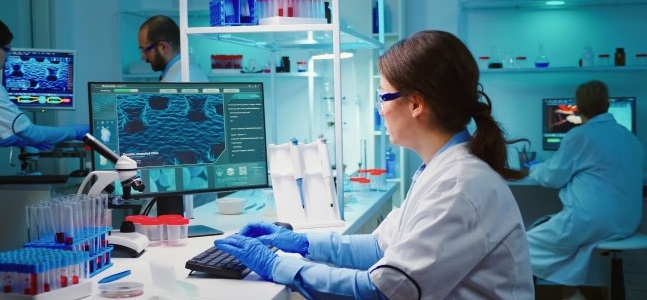Paternity testing has become more accessible and convenient with the introduction of home DNA test kits. These kits offer privacy and convenience, allowing individuals to determine paternity from the comfort of their own homes.
However, there are different types of paternity tests available, each with its own set of advantages and disadvantages. In this article, we will explore the different types of paternity tests, including home DNA test kits, lab-based paternity tests, prenatal paternity tests, and legal paternity tests.
What is a paternity test?
A paternity test is a test that helps to check if a dad is truly a child’s father or if a child is the son/daughter of a specific person. A paternity test is like a scientific test that checks if a man is a child’s biological dad. It looks at the genetic stuff in our bodies called DNA.
DNA is a body’s secret code; it comes from real mom and dad. We know you have many questions in mind about the paternity test. Keep reading and at the end, you will have answers to all the questions.
What is a DNA paternity test?
DNA comprises the genetic blueprint passed down from both your mother and father. The term “paternity” is specifically related to fatherhood. A DNA paternity test uses DNA analysis to determine whether a man is the biological father of another person.
How accurate is a DNA paternity test?
It’s a very accurate way to establish paternity, typically exceeding 99.9% accuracy.
What are the methods of paternity or DNA tests?
- Blood Test: Both father and child give blood samples at a medical facility or ask a lab to collect from home. Then, the analysis is performed at the lab.
- Cheek Swabs: Father and child swab inside their cheeks to collect cells naming buccal cells. Similar to blood tests, you can collect check swabs at home and then send them to the lab for analysis. Some labs have their paternity test kits in the market that you can use to collect cheek swabs and then send them to the lab.
- Fingerprints: Thanks to technology, you can now do paternity tests at home using a home paternity test kit. Both father and child place their fingers on the kit which matches their SNPs and provides 100% accurate results within minutes.
Types of Paternity Tests
1. Home DNA Test
Home DNA paternity test kit offer convenience and privacy. Labs typically provide these kits to their customers, allowing them to send the DNA sample to the lab. Customers seal the sample inside an envelope to ensure their privacy remains intact.
This is a good way to check paternity for informational purposes and satisfy oneself. If privacy is a concern and the reports do not include the names of the individuals involved, they cannot be used legally.
Advantages:
- Convenience: You can do this from the comfort of your own home..
- Privacy: Ensures privacy as the samples are collected at home.
- Cost-effective: Generally more affordable than lab-based tests.
Disadvantages:
- Limited legal validity: Results may not be admissible in court.
- Lower accuracy: Results may not be as accurate as lab-based tests.
2. Lab-based Paternity Tests
Lab-based paternity tests are crucial, especially in legal cases. The major difference between a home DNA test and a lab-based paternity test is that in a home DNA test kit, the customer collects their DNA sample. In contrast, in a lab-based paternity test, a medical professional collects the DNA sample. Lab-based paternity tests ensure meticulous care and handling throughout the entire process.
Advantages:
- High accuracy: Results are highly accurate and reliable.
- Legal validity: Results are admissible in court.
- Professional sample collection: Samples are collected by trained medical professionals.
Disadvantages:
- Higher cost: Generally more expensive than home DNA test kits.
- Longer turnaround time: Results may take longer to process.
3. Prenatal Paternity Tests
Prenatal paternity tests offer a unique solution for those seeking clarity on paternity during pregnancy. These tests allow for the determination of a baby’s DNA before birth, offering an early insight into paternity.
However, it’s essential to note that prenatal paternity tests are more complex compared to postnatal tests. They necessitate the involvement of medical professionals for sample collection, typically through procedures like amniocentesis or chorionic villus sampling (CVS).
Advantages:
- Early determination of paternity: Paternity is established before the baby is born.
- Beneficial for pregnancy planning.
Disadvantages:
- Invasive procedure: Requires medical intervention for sample collection.
- Higher risk: Procedures like amniocentesis and CVS carry a small risk of complications.
4. Legal Paternity Tests
In cases involving child support, custody agreements, and property rights, courts sometimes require DNA tests. The court orders a DNA test in such instances. Conducting this DNA test involves following strict protocols to ensure the integrity of the test at every stage is not compromised.
Advantages:
- Legal validity: Results are admissible in court.
- Stringent protocols: Ensures accuracy and reliability of results.
Disadvantages:
- Higher cost: Generally more expensive than home DNA test kits.
- Longer turnaround time: Results may take longer to process.
Comparison of Different Types of Paternity Tests
| Criteria | Home DNA Test | Lab-based Paternity Tests | Prenatal Paternity Tests | Legal Paternity Tests |
| Convenience | High | Moderate | Low | Moderate |
| Privacy | High | Moderate | Low | High |
| Cost | $60 – $200 | $130 – $200 | $120 – $200 | $250 – $500 |
| Accuracy | Moderate | High | High | High |
| Legal Validity | Limited | High | Limited | High |
| Turnaround Time | 2 days to 1 week | 2 – 3 days | 1 – 2 days | One Week |
Why do people need DNA paternity tests?
People may need DNA paternity tests for several reasons, such as to confirm legal paternity for custody or child support, determine biological relationships for immigration or adoption, resolve doubts about fatherhood, and secure accurate medical history. Individuals should personally consider the decision to get a paternity test based on their unique situations.
How is a DNA paternity test performed?
A DNA paternity test typically requires samples from the mother, child, and potential father.
- Home kits often use cheek swabs for cell collection. The lab sends these samples for DNA analysis to check for genetic matches between the child and the potential father.
- Legal paternity tests may need extra steps like a chain of custody and third-party verification. Following the kit’s instructions closely and proper sample collection are crucial for accurate results.
What happens after receiving the paternity test results?
After receiving the results, it’s important to consider the next steps carefully.
- In cases of legal paternity tests, individuals should discuss with a lawyer the implications the results may have on custody, child support, and other legal matters.
- For at-home kits, it’s vital to communicate with all parties involved before sharing or acting on the results.
- To conduct such a DNA test, one must follow strict protocols to ensure that the integrity of the test remains uncompromised at every stage.
- Regardless of the outcome, it’s important to approach the situation with empathy and understanding for all involved.
FAQs
Home DNA test kits can provide accurate results for informational purposes, but for legal purposes, lab-based tests are more reliable. Medical professionals conduct lab-based tests following strict protocols, ensuring accuracy and reliability.
In a home DNA test kit, users collect DNA samples by using swabs provided in the kit. They rub the swabs inside the cheek to gather cells containing DNA.
No, prenatal paternity tests focus solely on determining paternity by analyzing the DNA of the baby and potential father. They do not determine the gender of the baby.
Conclusion
DNA paternity tests are a reliable method to determine biological fatherhood, offering various options to suit different needs. Home DNA kits provide convenience, while lab-based tests offer accuracy and legal validity. Prenatal tests determine paternity before birth, and legal tests are used for court matters. The choice of test depends on the individual’s needs, with careful consideration required due to the potential legal and emotional implications.




